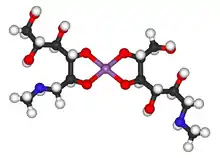Meglumine antimoniate
Meglumine antimoniate is a medicine used to treat leishmaniasis.[1] This includes visceral, mucocutaneous, and cutaneous leishmaniasis.[1] It is given by injection into a muscle or into the area infected.[1]
 | |
| Clinical data | |
|---|---|
| Other names | Meglumine antimonate |
| AHFS/Drugs.com | Micromedex Detailed Consumer Information |
| ATC code | |
| Identifiers | |
IUPAC name
| |
| CAS Number | |
| PubChem CID | |
| ChemSpider | |
| UNII | |
| ChEMBL | |
| NIAID ChemDB | |
| CompTox Dashboard (EPA) | |
| ECHA InfoCard | 100.004.645 |
| Chemical and physical data | |
| Formula | Variable |
| Molar mass | Variable |
| 3D model (JSmol) | |
SMILES
| |
InChI
| |
| | |
Side effects include loss of appetite, nausea, abdominal pain, cough, feeling tired, muscle pain, irregular heartbeat, and kidney problems.[1] It should not be used in people with significant heart, liver, or kidney problems.[1] It is not recommended during breastfeeding.[1] It belongs to a group of medications known as the pentavalent antimonials.[1]
Meglumine antimoniate came into medical use in 1946.[2] It is on the World Health Organization's List of Essential Medicines.[3] It is available in Southern Europe and Latin America but not the United States.[4][5]
Society and culture
It is manufactured by Aventis[6] and sold as Glucantime in France, and Glucantim in Italy.
See also
References
- World Health Organization (2009). Stuart MC, Kouimtzi M, Hill SR (eds.). WHO Model Formulary 2008. World Health Organization. p. 183. hdl:10665/44053. ISBN 9789241547659.
- Sneader, Walter (2005). Drug Discovery: A History. John Wiley & Sons. p. 59. ISBN 9780470015520. Archived from the original on 2016-12-20.
- World Health Organization (2019). World Health Organization model list of essential medicines: 21st list 2019. Geneva: World Health Organization. hdl:10665/325771. WHO/MVP/EMP/IAU/2019.06. License: CC BY-NC-SA 3.0 IGO.
- Bope, Edward T.; Kellerman, Rick D.; Rakel, Robert E. (2010). Conn's Current Therapy 2011: Expert Consult. Elsevier Health Sciences. p. 95. ISBN 978-1437735727. Archived from the original on 2016-12-20.
- Gorbach, Sherwood L.; Bartlett, John G.; Blacklow, Neil R. (2004). Infectious Diseases. Lippincott Williams & Wilkins. p. 355. ISBN 9780781733717. Archived from the original on 2016-12-20.
- Aventis press release Archived 2014-05-22 at the Wayback Machine, 15 April 2005. (in German)
External links
- "Meglumine antimoniate". Drug Information Portal. U.S. National Library of Medicine.